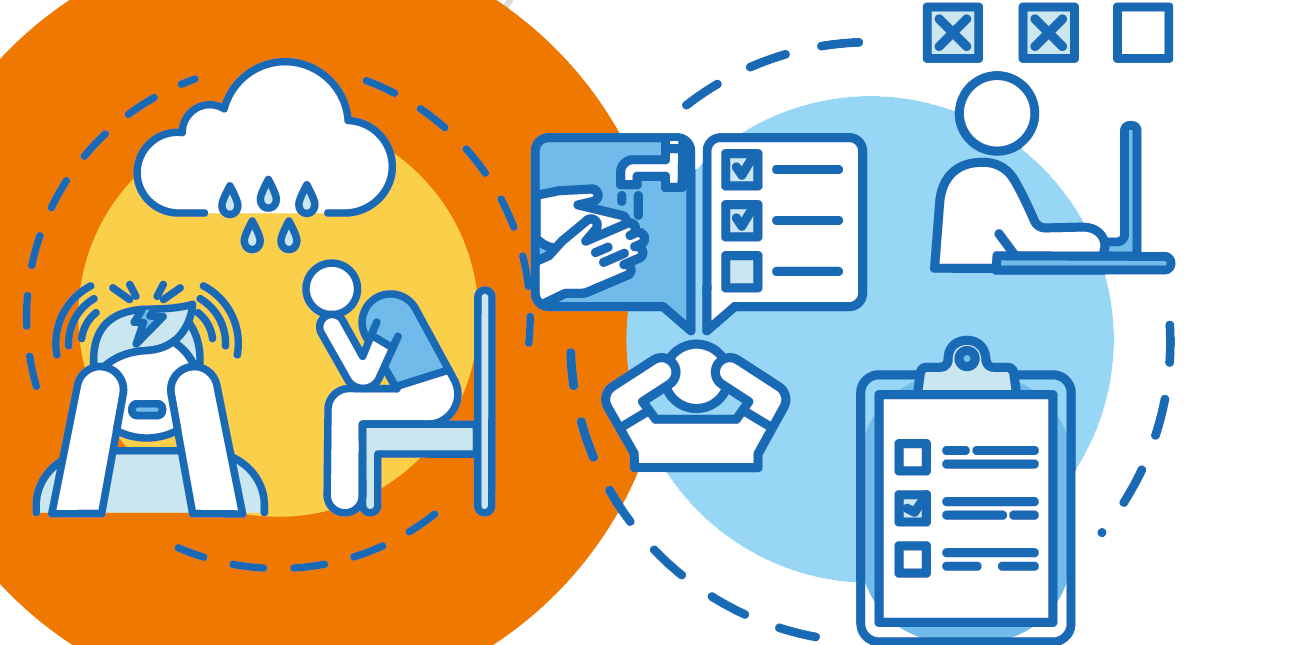10 steps to mental health

Managing wellbeing is just as important as managing your physical health right now…
Take care of your basic needs
Consider your psychological energy levels – you will need to “fill up” after “emptying the tank” so be aware of your “bandwidth”– it might take longer to think things through and make sense of things if you are feeling overwhelmed. Ensure rest and respite during work or between shifts, eat sufficient and healthy food. Be sure to manage your sleep and schedule time out to rest, engage in physical activity, and stay in contact with family and friends. Take days off. Extend the compassion you offer others to yourself.
Plan ahead
Before a shift (if possible, the day before) plan when and how you will incorporate brief breaks into your day where you do something enjoyable – taking a walk, watching a funny YouTube video or try an app like Chill Panda, which measures your heart rate and suggests tasks to suit your state of mind.
Exercise
A full workout is unlikely to be possible most days. But short bursts of exercise may be manageable. NHS-approved apps like Wahoo or Quick Fit will help you with seven minutes of exercise. On days off or after shifts do longer bouts of exercise – go for a walk, a run or stream a live yoga class.
Disengage from over-thinking
You may find yourself dwelling on what has happened during this extreme period. Spot when your thoughts have turned to ‘why’, ‘what if’ and ‘if only’. If you spot feelings of guilt, focus on what you would say to someone if they were in your shoes, all that you have done that has been helpful during the COVID-19 response and how grateful the wider population feels about frontline workers.
Use feeling overwhelmed as a cue to accept help
This is an unprecedented scenario – it’s okay to say you are not okay! Spot signs of burnout (feeling exhausted, overwhelmed, tearful, or flat) as a cue to accept a helping hand. It is important for staff to hear that “it’s okay to not be okay” and “it’s okay to ask for support”. No one should think they have to be superhuman.
Understand moral distress
Bearing witness to unacceptable things or making decisions that contravene the morals of the individual making them, resulting in severe guilt and shame – moral distress. For example, following new protocols on limiting numbers of family members at funerals, or not being able to comfort families the way you normally would can be distressing. This can affect everyone from those dealing with upset and distressed families, to cleaners and other colleagues who may fear contracting the disease.
Take a time out
Home is usually a place to unwind from the stresses at work, but COVID-19 has also infected where we live. And it has taken over the news. Limit your news intake as media consumption raises anxiety levels. Seek information updates at specific times during the day once or twice. The sudden and near-constant stream of news reports can cause anyone to feel worried. Get the facts at the World Health Organisation’s site www.who.int or the Deceased Management Advisory Group’s at www.dmag2020.org
Apps can help
Anxiety can prey on our minds and affect our sleep. We get worried about being worried, and worried about not sleeping. Apps can help with that. Daylight provides help to people experiencing symptoms of worry and anxiety, using evidence-based cognitive behavioural techniques, voice and animations. Sleepio is a clinically-evidenced sleep improvement programme that is fully automated and highly personalised.
Encourage open and honest conversations
Part of making the unbearable bearable is to stop, connect and show self-compassion and kindness to others, something we are all so good at. Understanding we are all affected and that the impact is expressed in different ways is important. Taking time to just breathe is often the most valuable thing any of us can do in the maelstrom of events. Anxiety and depression may emerge as a delayed reaction one or two years later. It is not helpful to intensively unload all the emotions while in the thick of it. When we are through the crisis and people can take a step back, we will support them to process what they have seen and experienced.
Embrace the positives
Although there are many negative aspects of the current situation, teams can grow stronger, individuals can develop and relationships can grow deeper as a result of this crisis. Together we are all stronger.
Tags: coronavirus, COVID-19, distress, exercise, mental health, support, wellness